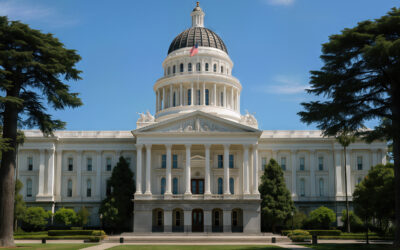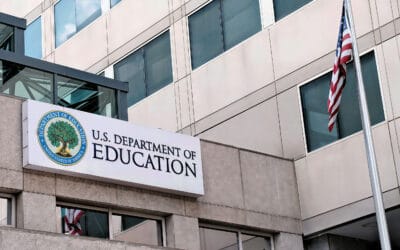As of early-Saturday afternoon, the regular 2025 legislative session has come to an end. Rarely in our team’s collective history can we recall an end to the legislative year that was as contentious as this year (maybe only in 2019, when a protester threw human blood in a menstrual cup onto the California Senate Floor during the final night of session).
This year, two major issues created tension and fireworks on the final night: charter school reform and addressing antisemitism in schools.
In the final days and hours of the 2025 session, the Legislature also sent bills to Governor Newsom dealing with 60 day-subs, banning ultra-processed foods in schools, immigration enforcement at schools, and online age verification of children, among others.
Charter School Legislation
Early Saturday morning, California lawmakers passed SB 414 to Governor Newsom, a bill sponsored by the charter school community to regulate non-classroom based (NCB) charter schools. The bill passed the Assembly 53-3 and cleared the Senate with 24 votes and no ‘NO’ votes before heading to Governor Newsom’s desk, despite being opposed by virtually all statewide education labor and management groups.
The legislation represents nothing short of a stunning defeat for unions and Assembly Member Al Muratsuchi (D-Torrance), who had spent months pushing a competing proposal, AB 84. That measure would have imposed strict new reporting and auditing requirements on NCB charters, but collapsed after negotiations with charter school advocates broke down in the final days. It is also worth noting that a coalition of statewide associations and LEAs representing charter school authorizers opposed both bills for their lack of coherence around charter school oversight expectations and no commitments to fund new mandates.
SB 414, authored by Senator Angelique Ashby (D-Sacramento), restructures how the state oversees NCB (which would now be termed “flex-based”) charter schools. The bill creates new auditing standards for all LEAs, tightens contracting rules, and dangles new funding for authorizers (though we are told those funding commitments are not backed by the state’s budget writers), while extending the moratorium on new “flex-based” charters through June 30, 2026.
Here is a summary of SB 414’s provisions:
- Creates New Oversight Office: Establishes the Office of the Education Inspector General to investigate fraud, mismanagement, and misuse of funds at charter schools and LEAs.
- Audit Expansion: Updates the K-12 audit guide to include detailed reviews of enrollment, teacher ratios, contracts, reserve levels, high-value transactions, and student work verification.
- Funding Changes: Revises funding determination for flex-based charters with new tiers (100%, 85%, 70%, or proportional) and allows indefinite renewals if schools continue to meet compliance through annual audits. Networks of schools must be reviewed together.
- Contracting Restrictions (all LEAs): Prohibits sectarian contracts, gifts or payments for enrollment, season passes to entertainment venues, contracts with parents for their own child, and reimbursement of families outside of IEPs. Requires contractors to be licensed, insured, and qualified.
- Provisions for Authorizers: Creates an unfunded mentor grant program for struggling authorizers and an oversight grant program to offset new costs. Authorizers with repeated audit findings cannot approve new flex-based charters until cleared and allows charters to locate outside the boundaries of authorizer, contradicting requirements in SB 1507 (2019).
- Additional Rules: Requires penalties for uncredentialed teacher hires, mandates offering 11th grade if offering 10th and 12th, and extends use of verified data for charter renewal decisions through 2028.
- Statewide Direction: Declares intent to establish a permanent statewide charter oversight entity.
SB 414 would expand oversight and compliance obligations for charters and their authorizers, while tightening spending rules across all LEAs. If signed, all school agencies should anticipate new workload tied to audits, contracting requirements, and reporting. Because the funding commitments in the bill were not authorized by the Department of Finance or the Budget Committees, groups representing school agencies have significant concerns over the costs required to implement the bill’s provisions.
It is unclear if Governor Newsom will sign the bill, but the current moratorium on new NCB charter schools expires January 1, 2026, applying pressure to do something considering the fraud and abuse in this space dating back over a decade.
Antisemitism Bill
California lawmakers advanced AB 715 (Zbur), a measure aimed at combating antisemitism in schools.
The passage of AB 715 was not without controversy. The California Teachers Association (CTA) took the role of lead opposition to the measure, warning that it could open the door to political disputes over curriculum and constrain local decision-making. This opposition put CTA directly at odds with the Legislative Jewish Caucus, which championed the bill as a necessary step to confront rising antisemitism in schools. The high-profile clash between one of the Capitol’s most powerful unions and a key legislative caucus created fireworks on the final night of session, drawing sharp rebukes of those opposed from Jewish Caucus members during floor speeches. The bill was also opposed by ACSA, CA County Superintendents, CSBA, and CFT, among others for similar reasons.
The opposition pointed to a specific provision in the bill, which only went into print on September 9, that will require “factually accurate” instruction. This, they argued, could lead to countless disruptions to instruction as “factually accurate” is often left up to interpretation when considering complex and, sometimes, emotionally charged historical issues. Interestingly, a common theme during discussions over the bill was that it was “far from perfect.” Many members noted the serious concerns they had over potentially stifling critical thinking in the classroom and exposing teachers to new and numerous complaints over instruction. With this being the first year of the two-year legislative session, a few members urged their colleagues to not push through flawed legislation when they could continue to work out the issues next year. Supporters of the bill, however, indicated the need to take action to protect California’s Jewish students now – not later, and members settled for commitments from the bill’s authors to continue working next year on clean-up to the bill.
The tension around AB 715 appears to have spilled into other policy arenas, particularly the charter school legislation. Observers noted that negotiations over charter reform, including the competing measures SB 414 (Ashby) and AB 84 (Muratsuchi), played out against a backdrop of strained relations between labor groups and lawmakers aligned with the Jewish Caucus.
Key Provisions of AB 715 include:
- New Oversight Structures: Creates the Office of Civil Rights under GovOps and an Antisemitism Prevention Coordinator to work with schools and report annually.
- Instruction and Materials: Requires instruction and all materials, curricular and professional development, to be “factually accurate,” consistent with adopted standards, and “free from advocacy or partisanship.”
- LEA Duties: Districts, COEs, and charters must investigate and remediate discriminatory materials or practices and ensure corrective action is implemented by the following school year.
- CDE Enforcement: Authorizes CDE to require alternative instructional materials, technical assistance from the OCR, and improvement plans.
- Vendor Accountability: Organizations providing discriminatory materials must reimburse LEAs and disclose violations to other LEAs they contract with.
- Parental Rights: Expands annual notifications to include protections under this bill and guarantees timely parental access to materials.
- Fiscal Impact: Estimates are the bill costs approximately $4 million annually to operate the OCR and the coordinator role, with additional costs for LEAs to strengthen oversight, monitoring, and compliance.
AB 715 also ties directly to SB 48 (Gonzalez), its companion bill. While AB 715 establishes the OCR and the Antisemitism Prevention Coordinator, SB 48 would expand the office further by creating coordinators for religious, racial, gender, and LGBTQ+ discrimination.
Other Education Bills
Other notable education bills that went to Governor Newsom in the final days of the 2025 Legislative session include:
- 60-Day Substitute Teachers (AB 1224 , Valencia): Extends the maximum number of days a substitute teacher may serve in a single classroom assignment from 30 to 60 days, until January 1, 2029.
- Ultra-processed Foods in School Meals (AB 1264 , Gabriel): Requires schools to start phasing out the use of “ultra-processed foods of concern” no later than July 1, 2029.
- Immigration Enforcement (AB 49 , Muratsuchi, SB 98 , Pérez, AB 1348, Bains): AB 49 restricts access by immigration enforcement agents to school campuses and student records without a judicial warrant. SB 98 requires schools, community colleges, and CSUs to provide notification to families and staff if immigration enforcement agents have been confirmed on campus. AB 1348 adds “immigration enforcement activity” to the list of events that an LEA may seek a J-13A waiver for.
- Online Age Verification (AB 1043 , Wicks): Requires platforms to verify the ages of children online.
- Caregiver Authorization Affidavit (AB 495 , Rodriguez): Expands the list of relatives of pupils as eligible caregivers.
What’s Next?
The Governor has through October 12 to act on these bills. We will continue to keep you informed on developments on these and other important bills.




0 Comments